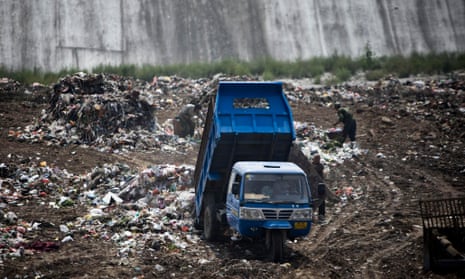When industry talks about “zero waste”, the goal is to send nothing besides hazardous waste to landfill. To achieve this, materials that previously would have been thrown away are recycled, repurposed or even designed out from the beginning. Simple enough. But is that what actually happens and do consumers even care?
A recent live discussion on Guardian Sustainable Business put zero waste under the spotlight to work out what’s really going on. As a reader, consumer and non-expert, what does zero waste mean to you? Do you think incineration should be called zero waste? Would you buy a product with a zero waste label? To get the ball rolling, we’ve rounded up five key takeaways from the debate. Let us know what you think.
1. Zero waste might not necessarily mean zero waste
The panel broadly agreed that ambitious targets are helpful. And, in the case of zero waste, it is better to underachieve slightly on a tougher target than overachieve on something “easier”.
Rita Yi Man Li, director of the Sustainable Real Estate Research Center at Hong Kong Shue Yan University, provided a useful analogy: if a student sets a goal of simply passing a test, they may end up with 50 marks. If that student sets a goal of 95 marks, they may get 80. She concluded that enthusiastic targets are therefore necessary. In the case of many businesses, they’re surprisingly achievable as well.
2. Do zero waste and circular economy mean the same thing?
The discussion began with an attempt to define exactly what zero waste means. Some panelists felt it should not be grouped together with the circular economy. “I would not use the term zero waste when referring to circular economy or sustainability,” said Nick Voulvoulis, reader in environmental technology at the Centre for Environmental Policy, Imperial College London. “It is not just the ‘zero’ we have a problem with – the moment you call something waste you are reducing its value.”
Li pointed to various interpretations of what zero waste means for different industries. In the animal slaughter industry, for example, zero waste means that all discarded materials are used for productive purposes. Where construction activities are concerned, Zero Waste Scotland thinks of zero waste in terms of what purpose other industries may have for discarded construction materials.
These principles sound suspiciously similar to those of a circular economy, don’t they? “Zero waste terminology is obsolete (and confusing/misleading). Circular economy is more meaningful and achievable”, said Forbes McDougall, head of circular economy at Veolia.
However, for Unilever, there was less concern about distinguishing between the two ideas. “We have a vision for the future that the materials that come in to our factories either go out as a product or back into the supply chain”, said Tony Dunnage, group environmental engineering manager.
3. Where do consumers come in?
It is great if you’ve got a rigorous process in place to reduce waste within your own operations, but it’s important to consider what happens to goods after they leave the distribution centre.
That makes sense, said Gareth Dinnage, owner of Seacourt Printing, but how do we track post-consumer materials? “We know our main paper is made using 100% recycled paper in a factory powered by biomass and nuclear mix; we print using 100% renewable energy, using the most sustainable print process with zero materials going to landfill; we then assume that the end printed product is recycled – but how could we possibly know?” he asked.
If you, the end consumer, knew what efforts had gone into producing a zero or low waste product, would that change your behaviour as far as recyling or reusing it? Do you support Extended Producer Responsibility or would you like to see more focus on consumer behaviour change?
4. Is it waste, resources, or surplus? Should we care?
As we increasingly incorporate notions of the circular economy into sustainable business, companies must go back to the drawing board and in some cases completely rethink notions of waste or, rather, resources.
Mark Linehan, managing director at the Sustainable Restaurant Association, raised an issue particular to the food industry. “The lack of distinction between waste and surplus in the context of food is really problematic,” he said.
But who cares if we call it waste, as long as it doesn’t end up in landfill? “If the material can be reused, recycled, repurposed etc, then it does not matter that it was waste at the beginning of this series of loops,” said McDougall.
5. It’s not all up to business
If landfill is not available then industries are forced to be creative and invest in alternatives. However, policy and infrastructure still needs to be in place so that rubbish is not illegally dumped or exported.
“We have a responsibility to manage the waste generated by society today in a safe and responsible manner. It would be very detrimental to the environment and perhaps even a risk to public health to close infrastructure without having sustainable alternatives in place,” said McDougall.
Scotland has mandated that by 2016 businesses producing more than 5kg of food waste per week will have to put it out for separate collection. What kinds of policies do you think government should put in place to reduce waste? How can your government be a part of the zero waste and circular economy agenda?
What do you think? Contribute in the comments section below or tweet us at @GuardianSustBiz.
The sustainable living hub is funded by Unilever. All content is editorially independent except for pieces labelled brought to you by. Find out more here.
Join the community of sustainability professionals and experts. Become a GSB member to get more stories like this direct to your inbox.

Comments (…)
Sign in or create your Guardian account to join the discussion